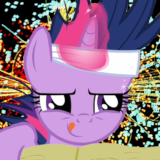Timekeeping in Equestria · 12:07am Nov 9th, 2014
Update - story published: Time on Their Hooves
I've almost finished the first draft of a new story, which at over 25,000 words, is my longest to date. It still needs a lot of work before it will be ready for publication. Like most my stuff, this one has a good dose of science, but (I hope) it also has significant merit as a story.
It's about time. It addresses the question: How do you accurately keep track of time in a universe where the forces governing the movement of astronomical bodies have minds of their own?
The story of timekeeping (in our world) is a fascinating chapter in the history of science. Early clocks, built by monks in the monasteries of medieval Europe to keep to their rigid schedule of work and prayers, were pretty basic. They could gain or lose over half an hour over the course of a day. Accurate timekeeping was done by astronomy. Medieval stargazers knew how to tell the time from the position of the sun and stars, even if they had no idea of the forces driving the motion of the heavens.
Motivation to make accurate mechanical clocks came from the demands of navigation, specifically the longitude problem: how to tell the longitude—the degrees east or west of Greenwich (or your chosen meridian) when at sea. Given an accurate watch, it's simple. At noon, when the sun is at its highest in the sky, you look at your watch showing Greenwich time, and take 15 degrees for every hour difference. Except that pinning down your position to 10 miles, requires a watch accurate to the minute, after many months at sea. This was impossible with the timepieces of the seventeenth century.
This year marks the tricentenary of the Longitude Act. In 1714 the British Parliament offered a prize of up to £20,000 for a 'practicable and useful' method of finding longitude at sea. This led to the pioneering work of John Harrison, who build a series of increasing accurate marine chronometers to meet this goal.
But the excessive cost of such chronometers meant that even centuries later most people had to make do with rather less accurate mechanical watches. For much of the twentieth century, it was normal for a watch to drift by five or ten minutes each day. Precision Swiss-made chronometers became a status symbol for the rich.
Fast forward to 1978, when a contemporary writer wrote of a planet whose, “ape-descended life forms are so amazingly primitive that they still think digital watches are a pretty neat idea.” Combining microelectronic circuitry with piezoelectric quartz resonators brought accurate time to the masses. For under ten dollars, you could buy a sexy little gadget with LCD screen, which could keep time to better than 30 seconds per month.
Meanwhile in laboratories there had been an even more revolutionary development in not-so-portable timepieces. It had been known for years that the frequencies of radiation emitted and absorbed by atoms could in principle form an accurate time standard, but was not until 1955 that the first atomic clock was built which could beat quartz. This technique has now been improved to a precision of just a few seconds in 100 million years.
Such performance is not 'astronomical' – it's better than that! The atomic standard is more precise than the period of our spinning planet. Hence the base unit of time was redefined as 9,192,631,770 oscillations of a caesium atom. And time is now maintained by a worldwide network of atomic clocks, disseminated to our phones and computers through GPS satellites and radio networks.
This is our world. But how did this story unfold in Equestria? Where the connection between time and the position of the sun and moon is rather different. The time of sunrise is not set by the laws of physics, but by the daily whims of two pony sisters.
How does Celestia know at what time to raise the sun? Well it seems a fair guess that she has an alarm clock connected to an atomic standard. But how did Equestria function before the development of such clocks? Timekeeping must have an important role in Equestrian society, maybe reflected by the fact that the hourglass is a common cutie mark. And the fundamentally different relation between time and the heavens could have all sorts of consequences.
Johannes Kepler (1571-1613) is reported to have said, when discussing the reform of the Julian calendar that his fellow protestants, 'would rather disagree with the sun than agree with the Pope'. (Some sources attribute this to Voltaire.)
How might such an issue have unfolded in Equestria, where disagreeing with the sun is not such a Canutine gesture as in our world?
These ideas I will explore in my next story. Unfortunately this project is taking rather more time than I anticipated. As this will be set in a historical era, in the years before Luna's exile, I was obliged to engage in a fair amount of world building, and create quite a few OCs. This has been fun, but I then needed to expand the story to properly introduce them to the readers and set the scene. This has meant significantly more work than my previous stories.
My target is to get a few chapters out by Hearth's Warming, and finish it off over the holiday season.




Find a unicorn who knows a time-telling spell, obviously.
I'm fascinated by issues of measurement and the weird combination of astronomical phenomena in Equestria, and Short Skirts and Explosions' latest story has gotten me totally on a time travel kick, so count me as officially jazzed for this fic.
Will love to read it. Hmm atomic clocks maybe Pinkie will be involved?
Maybe they use a sundial for timekeeping, as a speculation of course.
Economic growth is neat.
As for the puzzle you present, I expect Princess Celestia hastily set up a prediction market where ponies could make bets on the accurate time for some given standard. Who needs clocks?
http://www.npr.org/2014/11/03/361069820/new-clock-may-end-time-as-we-know-it?utm_source=facebook.com&utm_medium=social&utm_campaign=npr&utm_term=nprnews&utm_content=202503
An amusing article on a clock so precise that height differences make it out of sync with other clocks
Well, I'm certainly intrigued. I figured the link between pony and celestial object goes both ways, and the sun alerts Celestia when it's in need of a nudge, but that's just my take on the matter, and it raises the question of how the sun would know. I look forward to seeing your interpretation.
2582985
TAI has been been correcting for the height (or rather, local gravitational field magnitude) based differential since 1977. It's not a new phenomenon (although the scale at which the effect becomes apparent for the clock in the article is impressively small).
I think it's fascinating that the Longitude Prize was inspired by reports of the Scilly naval disaster, but that disaster wasn't obviously due to an error in estimating longitude. The NTSB kinda failed their root cause analysis, there, but hey, we got good tech development out of it.
I gave a talk a few months ago on how GPS works, and included some of this history. I've been thinking for a while that a pony story in your style on the development of GPS would be pretty great, but couldn't see how to justify it in that setting. Maybe your story will give me some ideas.
My take is that Celestia uses the sun as a giant atomic clock. That her connection lets her know of every single little interaction in the sun, even if obviously she doesn't focus on that much she still knows with a high degree of accuracy how much time has passed. This also led to Equestia inventing the atomic clock not terrible long after the water clock since Celestia's talent means she could figure out a way to use atomic interaction to tell time on a smaller scale via magic fairly easily. Of course gears and quartz would come up since an atomic clock even with magic isn't too practical, but that's the way I see it for sure.